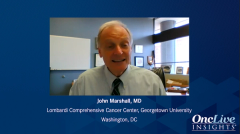
A Survey of Patient Presentation, Testing, and Diagnosis in ESCC
Broad discussion from expert John Marshall, MD, on the current standards of diagnosis care in esophageal squamous cell carcinoma (ESCC).
Episodes in this series
Transcript:
John Marshall, MD: Hello, and welcome to this OncLive® My Treatment Approach program titled “The Evolving Treatment Landscape of Esophageal Squamous Cell Carcinoma.” I’m John Marshall, a professor of medicine and oncology at Georgetown Lombardi Comprehensive Cancer Center at Georgetown University, and the chief of the division of hematology-oncology at MedStar Georgetown University Hospital in Washington, DC. Welcome, and thank you for joining me. Today we’re going to provide an overview of esophageal squamous cell carcinoma and discuss several key updates to the treatment landscape. We’ll review the data in the context of the treatment algorithm and elucidate how we can apply the evidence to our clinical practice to improve patient outcomes. Let’s get started on our first topic.
First, let’s look at what kinds of esophageal carcinoma there are and how common they are. Upper esophageal cancers tend to be squamous cell cancers, and the classic risk factors for that are alcohol, tobacco, etc. Those squamous cell cancers have been declining, at least in Western populations, although they’re still out there. You’ll still see them. If you go a little further down, to the gastroesophageal junction, you get adenocarcinomas. Those are more common in Western populations probably because of reflux and Barrett esophagus, obesity, and other problems such as that. These are increasingly 2 different cancers, even though for many years we’ve lumped them into 1. To diagnose these cancers, as patients are coming in with dysphagia, you often diagnose them with an endoscopy. Usually, CT scanning is part of the basic staging. The real challenges you have in managing these patients are that they often come in with significant nutrition problems, they have pain, and they require multidisciplinary care. The location of these tumors is very difficult with regard to surgery. Chemoradiation can be effective for local control, but often it’s a big challenge to patients who have comorbidities and nutritional issues coming in. We recognize that this patient population can be challenging.
Whenever you identify a patient with particularly squamous cell cancers of the esophagus, it’s critical to do a very solid, basic staging—with imaging, an endoscopic ultrasound, and biopsies. Once you get that tissue, you need to know more than just that it’s squamous cell cancer. Yes, you want to know differentiation and the like, but we do increasingly want to know other biomarkers. We’re testing for microsatellite instability [MSI] in every cancer and looking for immunotherapy choices. We’re looking at PD-L1 expression and we’re looking for HER2 [human epidermal growth factor receptor 2] expression. We’re also looking for rare mutations. Increasingly, we’re testing patients for broader profile, but it’s critical in upper–GI [gastrointestinal] cancers to test for PD-L1, MSI, and HER2. Those are the ones that are going to be most informative for your patient.
Transcript edited for clarity.





































